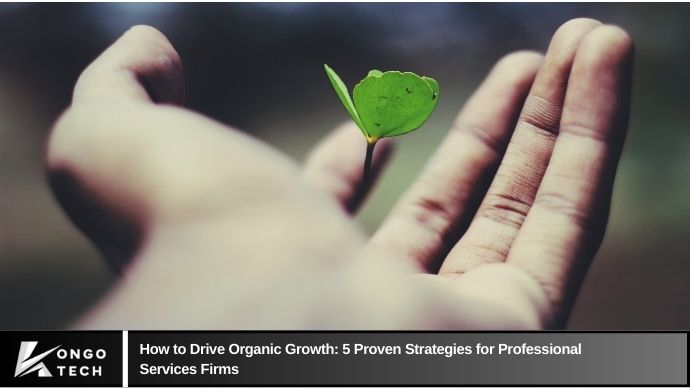In today’s competitive digital landscape, professional services firms—whether they specialize in law, accounting, consulting, or any other niche—face unique challenges when it comes to attracting and retaining clients. Unlike e-commerce businesses, professional service providers must build trust, demonstrate expertise, and nurture long-term relationships. But how can you stand out in a crowded market?
The answer lies in driving organic growth. Organic growth refers to the process of building your business and brand through non-paid methods, primarily focused on attracting and retaining customers through valuable content, SEO, and fostering relationships.
For professional services firms, leveraging the right digital marketing strategies can make a huge difference in establishing authority, reaching your target audience, and ultimately driving long-term, sustainable business growth. In this blog post, we’ll dive deep into 5 proven strategies that professional services firms can use to drive organic growth in 2024.
What is Organic Growth and Why Does It Matter for Professional Services Firms?
Organic growth is the process of increasing your client base and revenue without relying on paid advertisements or campaigns. For professional services firms, this is especially important because potential clients are often seeking long-term, trust-based relationships. They are not simply looking for a quick solution—they are looking for reliable partners who can provide expertise and add value to their businesses.
Building organic growth typically revolves around creating valuable content, improving search engine visibility, enhancing customer relationships, and fostering client trust. The beauty of organic growth is that it offers sustainable, long-term results and minimizes the need for ongoing advertising spend.
In the next sections, we’ll explore 5 proven strategies that can help professional services firms achieve this type of growth.
Strategy 1: Optimize Your Website for SEO
One of the most important components of driving organic growth is ensuring your website is optimized for search engines. If you want your professional services firm to be discovered by potential clients, SEO (Search Engine Optimization) is essential.
Importance of SEO for Professional Services
When potential clients search for services that you offer, they usually turn to Google. For example, a law firm might want to rank for terms like “best family law attorney near me,” while a consulting firm may aim to rank for terms like “small business marketing consulting.” By optimizing your website for relevant keywords, you increase the chances of being discovered by these search queries.
Key SEO Elements for Organic Growth
There are several key elements to focus on when optimizing your website for SEO:
- Keyword Research: Identify high-traffic keywords that your target audience is searching for. Use tools like Google Keyword Planner, Ahrefs, or SEMrush to find the right keywords.
- On-Page SEO: This includes optimizing titles, meta descriptions, headings (H1, H2), and images to ensure search engines understand your content.
- Content Optimization: Incorporate your keywords naturally in your website copy, blog posts, and other content assets. Aim to provide the most valuable, informative content in your niche.
- Mobile Optimization: With more people searching on mobile devices, Google prioritizes mobile-friendly websites. Make sure your site is responsive and fast.
- Link Building: Quality backlinks from reputable sources can boost your site’s authority and rankings.
Technical SEO for Firms
Technical SEO ensures that search engines can crawl and index your website efficiently. This includes optimizing the site structure, ensuring fast page load times, and fixing any broken links. For professional services firms, it’s also important to ensure that the website has a secure HTTPS protocol to increase trustworthiness with both Google and users.
Strategy 2: Content Marketing for Client Education
For professional services firms, content marketing is a fantastic way to educate clients, build trust, and demonstrate expertise. By consistently producing high-quality content, you can address common pain points, answer questions, and offer valuable insights—establishing your firm as a go-to resource in your industry.
Types of Content that Drive Engagement
- Blogging: Regular blog posts that tackle common client questions or industry-related issues are an excellent way to provide valuable information. Topics like “how to choose the right accountant” or “10 things every entrepreneur should know about tax law” can resonate with your target audience.
- Video Content: Video is one of the most engaging content formats. Consider creating educational videos or client testimonials to add more visual and interactive appeal.
- Infographics: Use infographics to simplify complex ideas or data. Infographics are highly shareable and can attract links from other websites, helping to boost SEO.
Blogging and Thought Leadership
Blogging is a key component of content marketing, especially when you aim to position yourself as a thought leader in your field. Publish articles that discuss current trends, share case studies, and offer actionable advice. When clients see your firm as a knowledgeable leader, they’re more likely to trust you with their business.
Case Studies and Testimonials
Potential clients want proof that you can deliver results. By showcasing case studies and client testimonials on your website, you can demonstrate your track record of success. Positive reviews and success stories not only build credibility but can also improve conversion rates.
Strategy 3: Build Trust and Authority Through Social Proof
Trust is essential for professional services firms. Clients are making significant investments when they hire a lawyer, accountant, or consultant, and they want to feel confident in their decision.
Client Reviews and Testimonials
One of the best ways to build trust is by showcasing client reviews and testimonials. Happy clients are often willing to provide positive feedback that can be displayed on your website or third-party review sites like Google My Business or Trustpilot.
Thought Leadership and Expert Presence
Being seen as an expert in your field can help build your authority. Contribute guest articles, speak at industry events, or participate in webinars. Share your insights on LinkedIn, and encourage clients to see you as a thought leader.
Online Communities and Forums
Join relevant online communities and forums where your target clients may be seeking advice. For example, answer questions on sites like Quora, Reddit, or LinkedIn Groups. By providing valuable, actionable advice, you can increase your credibility and attract new clients.
Strategy 4: Local SEO and Geo-targeted Marketing
If your professional services firm serves clients in a specific region, local SEO is critical to your organic growth efforts. When people search for services “near me,” you want your business to appear at the top of local search results.
Importance of Local SEO for Professional Services
Local SEO helps you optimize your website and online presence to appear in search results for people searching in your area. This is especially important for service providers like doctors, lawyers, and accountants who work with clients locally.
Google My Business Optimization
Ensure that your Google My Business listing is fully optimized. Add your business information, photos, service details, and client reviews. This increases your chances of appearing in the Google 3-Pack—the three businesses that appear at the top of local search results.
Building Local Backlinks
Reach out to local businesses, organizations, and events to build backlinks to your website. Local backlinks help improve your authority in your geographic area and improve local search rankings.
Strategy 5: Leveraging Referral Programs and Networking
Referrals are a powerful way to grow organically. Word-of-mouth marketing has always been one of the most effective forms of advertising, and it still holds true for professional services firms.
Referral Marketing Strategies
Encourage happy clients to refer you to others. You can offer referral incentives, such as discounts on future services or a small token of appreciation. Referral programs increase client loyalty and bring in high-quality leads who are more likely to convert.
Networking and Partnerships for Organic Growth
Form strategic partnerships with complementary businesses or professionals in your field. For example, an estate planning lawyer may partner with a financial advisor to provide joint services. Networking within your community, both online and offline, also helps create brand awareness and bring in new clients.
Creating a Seamless Referral Process
Make sure that your referral process is easy and seamless. Provide clients with referral cards or online links that they can easily share. The easier you make it for clients to refer others, the more likely they are to do so.
Conclusion
Driving organic growth for your professional services firm is not an overnight process, but with the right strategies in place, you can build long-lasting success. By focusing on SEO, content marketing, social proof, local SEO, and referrals, you can increase visibility, build trust, and foster meaningful client relationships. Over time, these efforts will help you stand out in a crowded market and grow your client base without the need for heavy advertising spend.
FAQs
1. How long does it take to see results from organic growth strategies?
Typically, you can see results in 3 to 6 months, though SEO and content marketing may take longer to show significant returns.
2. How can I improve my Google My Business listing for local SEO?
Ensure that your business name, address, and phone number (NAP) are consistent across all platforms. Add accurate business hours, high-quality photos, and encourage client reviews.
3. Can I use paid ads while focusing on organic growth?
Yes, while organic growth is key, paid ads can be useful for short-term promotion and increasing visibility, especially when you’re just starting.
4. What are some effective content ideas for professional services firms?
Consider creating how-to guides, client success stories, industry analysis, and Q&A posts to engage your target audience.
5. How do I track the success of my organic growth efforts?
Use tools like Google Analytics, Google Search Console, and social media insights to track website traffic, engagement, and conversion rates

